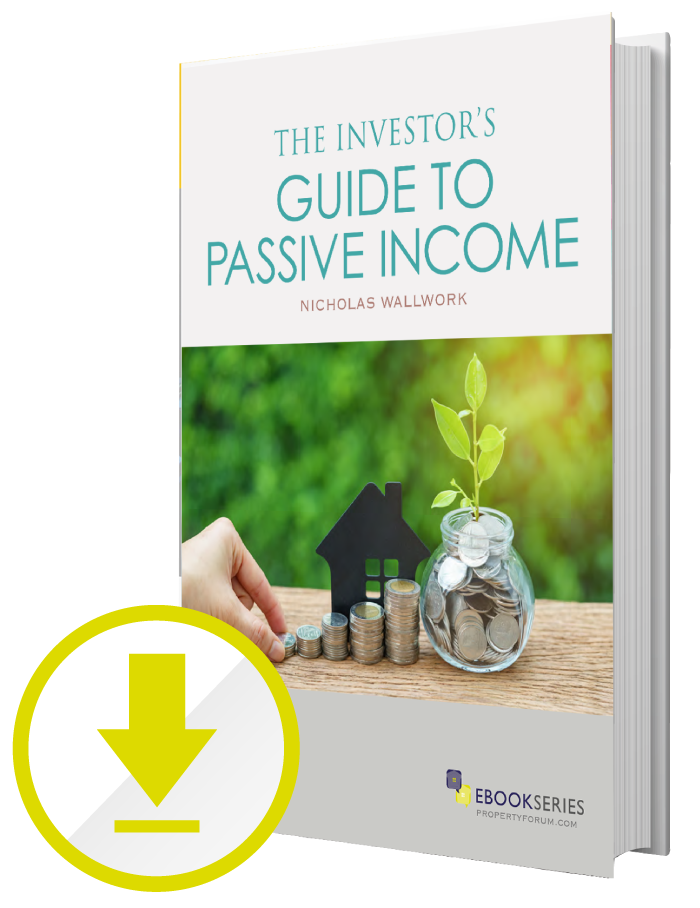Email: info@propertyforum.com
Passive Income through property investing; Loan Notes, Crowdfunding and Off-Plan Property
There are a few different investment options you can choose if you want to create a passive (hands-off) income from property. These include Property Crowdfunding, Loan Notes and some Off-Plan Property options. This page gives you all the resources you need to learn more about each option, including this free Passive Income ebook to get you started.

Chat in our forum for free!
Passive property investment simply means that once you have invested funds into a property project, the investor has little to no input in the management of the asset, allowing them to simply sit back and enjoy the financial returns. For those with demanding work schedules and busy home-lives, passive ventures are a great way to benefit from the returns of the UK property market. Use the forum below to ask a question about any Passive Income strategy, or read on for more education resources on this topic.
Property crowdfunding is an accessible example of a passive investment option. In these instances, a group of people come together to buy a single property asset. All the investors will then own a small share of the same asset. Within property crowdfunding, the passivity lies in the online platform that brings together the larger numbers of investors. It is this platform that becomes the Special Purpose Vehicle (SPV) that organises and manages the entire investment process for all involved.
Property crowdfunding helps to solve two disadvantages of buy-to-let property investments: in a traditional buy-to-let a single investor needs a large lump sum to buy a property and also enough time to complete the purchase and manage the tenants. With property crowdfunding, you can invest in only a proportion of a property and receive a passive income.
The Benefits of Property Crowdfunding
The most appealing advantage of property crowdfunding is that the minimum investment is far less than other property investment strategies. In some instances, and depending on the online platform, an individual can invest less than £1000 and as little as £100.
Crowdfunding in property is an example of equity crowdfunding, where everyone involved owns a small share of the same property. Unlike peer-to-peer lending where you own the debt, in property crowdfunding, you would own the value/equity.
This passive property investment option is more commonly a long-term investment. Once a property is collectively bought and rented out, the rental income is divided between the multiple owners and you would receive an annual income as your investment return.
A Joint Venture (JV) is a business arrangement between two or more parties, whereby they agree to combine their resources to achieve the same goal. In this case, to invest in property. All JVs are a temporary but formalised partnership of builders, finance houses and developers. The partnership contracts them together for a particular development project through the creation of a temporary subsidiary company, known as an SPV.
The SPV, in most cases, is a private limited company which has been created specifically for the development project. These projects could be anything from new housing developments to the conversion of commercial buildings into apartments.
As an investor, you have the opportunity to buy shares in this SPV. These shares entitle you to a proportion of the profit generated by the SPV. Once the properties have been sold, the SPV returns your initial investment along with any profit.
As with any investment, you must carry out due diligence checks and be aware of the risks and rewards that are involved with this passive investment model.
An alternate passive investment method is developer loan notes. Loan note property investments offer investors the possibility of high returns on your capital with short-term exit strategies, all through a hands-off, passive investment option.
A developer loan note, in its simplest terms, is an interest-beating IOU. As the investor, you would be offering a loan to a property developer, and they would agree to pay the amount back with a fixed amount of interest. Unlike an IOU, however, loan notes offer more security to the investor, as they can be ‘secured’ against the developer’s assets.
In the current financial market, loan notes offer the highest rates of return; typically varying from 8% and 12% per annum.
Before entering into any loan note investment, it is recommended you have a look through the Due Diligence Guide to Developer Loan Notes. This 8-page booklet takes you through a trusted due diligence process that scrutinises any potential developments, contracts and projects. As with any property investment, there is always a level of risk, and developer loan notes are no exception.
The majority of passive property investment options are based upon buying off-plan property or loaning money to new-build developments.
For many investors, these projects come with many advantages that make turning over a profit that bit easier. Newly constructed properties tend always to be more energy-efficient, making them cheaper for a homeowner or tenant to heat and run. Additionally, they will be sold with structural warranties and other guarantees from the developer (sometimes rental income is guaranteed for the first few years). All these factors increase the properties saleability, reducing the risk an investor takes at making an income.
Moreover, new-build developments promote and complement contemporary lifestyles which are becoming increasingly popular — for example, open-plan kitchens and easy access into any outdoor space. These properties can, therefore, enter the property market straight away without any renovation.
However, Investing in off-plan properties can be risky.
By purchasing off-plan, as a buyer and investor, you will be offered a significant discount on the current market price of the developer. And, if all goes to plan, by the time the property is completed, it will have already increased in value. However, one of the draw-backs is that the finished product may not be quite what you visualised, and you could be left disappointed with the specification and size of the property. More importantly, this could affect your turnover.
It is important to remember that all possible sale prices and lettings figures are very much estimated, and as much as they can increase, they can also decrease. This is where your due diligence and research into the track record of a developer is crucial.
If you would like any further information regarding passive investment options, we have our Developer Loan Note Investment guide, complete with our educational Loan Note Video Series, to give you all the information you need.
Have you considered an expert mentorship to help you create a passive income portfolio?
If you are considering any sort of passive income opportunity, a 1-2-1 mentorship session would allow you to benefit from the 20+ years of expertise as a Loan Note Developer and Property Investor that our CEO Nicholas Wallwork can provide. Find out more using the link below.
Read the latest news articles on Loan Notes and Crowdfunding...
Learn more about other property investment strategies...

Learn more about owning your own Holiday Let property investment (whether it’s in the UK or overseas), including how to source, manage, finance and advertise a successful holiday let.

Lease Options and Rent-to-Rent property investment provide an opportunity to get into property investing with little up front capital. Find out more with our free ebook downloads.

Property developing can come in many forms, including renovation projects, change of use conversions, and land development. This page explains all your options with property development.

